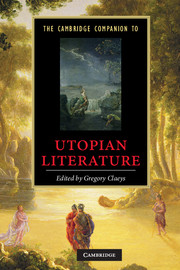Book contents
- Frontmatter
- Part I History
- 1 The concept of utopia
- 2 Thomas More’s Utopia: sources, legacy, and interpretation
- 3 Utopianism after More: the Renaissance and Enlightenment
- 4 Paradise transformed: varieties of nineteenth-century utopias
- 5 The origins of dystopia: Wells, Huxley and Orwell
- Part II Literature
- Further reading
- Index
4 - Paradise transformed: varieties of nineteenth-century utopias
from Part I - History
Published online by Cambridge University Press: 28 September 2010
- Frontmatter
- Part I History
- 1 The concept of utopia
- 2 Thomas More’s Utopia: sources, legacy, and interpretation
- 3 Utopianism after More: the Renaissance and Enlightenment
- 4 Paradise transformed: varieties of nineteenth-century utopias
- 5 The origins of dystopia: Wells, Huxley and Orwell
- Part II Literature
- Further reading
- Index
Summary
If the nineteenth century was not the Golden Age of utopianism, it was certainly a golden age. All three major 'faces of utopia', to borrow Lyman Tower Sargent's phrase, flourished: literary utopias, non-fictional utopian social theory, and intentional communities. This Cambridge Companion highlights one of the 'three faces' - the literary utopia. My working definition of a literary utopia is a fairly detailed narrative description of an imaginary culture - a fiction that invites readers to experience vicariously an alternative reality that critiques theirs by opening intellectual and emotional spaces that encourage readers to perceive the realities and potentialities of their cultures in new ways. If the author and/or readers perceive the imaginary culture as being significantly better than their 'present' reality, then the work is a literary eutopia (or more commonly, a utopia); if significantly worse, it is a dystopia. Within this definitional framework, an overview of the nineteenth century could have an especially narrow chronological focus, since there is a general consensus that for most of the century utopian social theory and communal experiments thrived, but only in the final years of the century did literary utopias flourish. There is ample evidence to support this claim from North America to Great Britain, Europe, Australia, New Zealand and Asia.
- Type
- Chapter
- Information
- The Cambridge Companion to Utopian Literature , pp. 79 - 106Publisher: Cambridge University PressPrint publication year: 2010
- 10
- Cited by

